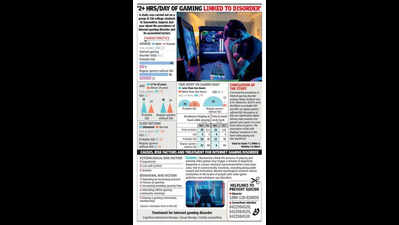Former gaming addict shares story to help others break free | Mumbai News – Times of India

Mumbai: The thrill of placing a bet on a virtual game with just a tap on a phone screen quickly spiralled into a real-world nightmare for a young woman. Shweta (name changed), a working professional in her mid-twenties, was drawn into the addictive world of online casino gaming till mounting debts pushed her to attempt suicide.Now, having survived that dark chapter, she is determined to bring awareness and support those struggling.Shweta’s journey into the world of online casino games began innocuously enough last year. Scrolling through social media, she found an attractive advertisement for a platform for sports betting, slots and dealer games. Curious, she visited the website and created an account, linking it to her digital wallet.“Working from home at the time, I would play online after work or at night,” Shweta recounted. Initially, she won some of the games. “I remember spending just Rs 5,000 and winning as much as Rs 2 lakh on the platform. I could buy gifts for my parents,” she said. Emboldened by the early success, Shweta began to wager larger amounts. The online platform offered special bonuses whenever a player reloaded his/her account balance. Shweta’s parents inquired about the sudden influx of funds, but she told them that she had been trading in shares. Soon her initial winning streak ended. “I kept playing, convinced that a big win was just around the corner,” Shweta said. She took out a personal loan of Rs 7 lakh, fuelled by the hope of a turnaround. But the windfall never materialised. “My savings were vanishing rapidly. I started borrowing from friends, making up stories if they asked why I needed funds,” she recollected. As debts mounted, she eventually spilled out the truth before her parents. Though heartbroken, her family stepped in to clear the debts.For a brief period thereafter, she managed to stay away from online money games. But the temptation proved too strong to resist. Earlier this year, she took out another loan of Rs 2 lakh to play. The familiar cycle of debt and despair began anew. “The stress of the repayments took over my entire life. I lost my appetite, and sleep became a distant luxury. Even when I managed to go out with friends, my debts were the only thing I could think about,” she said. Under the weight of this constant pressure, Shweta tried to end her life. Fortunately, she received medical help on time.“The next six weeks were a gruelling period of multiple surgeries at Bhatia Hospital. I was navigating both physical pain and dark thoughts, but the support of my parents and treating doctor, Shailesh Ranade, saw me through,” she recalled. Back home, Shweta is determined to share her experience with people lured by the same digital traps. “My advice is simple: Easy money is a myth. This is a bottomless pit and you will keep sinking. If you’re in trouble, talk to someone you trust. And never consider taking a drastic step. I am so grateful for this second chance at life,” she said.Shweta’s experience with virtual money games is not an isolated incident. Psychiatrist Dr Avinash De Sousa observed a worrying rise in gaming addiction and pathological gambling, particularly in the age group of 17 to 30. “Celebrities openly endorsing virtual money games make the common man believe that it is acceptable,” he said. Dr De Sousa described pathological gambling and gaming addictions as process addictions where the underlying issues like impulsivity, anger, or depression, will have to be treated. Sonali Patankar, co-founder of the non-profit Responsible Netism said that elements like logo placement, colours and the user interface of apps are all carefully constructed to keep users engaged. “There are no legal guidelines regulating design,” said Patankar.The legal landscape surrounding online money games remains complex. “The colonial-era Public Gambling Act doesn’t cover online gambling. The Supreme Court, in the case of K R Lakshmanan versus State of Tamil Nadu, ruled that an activity requiring a significant degree of skill cannot be classified as betting or gambling,” said cyber advocate Dr Prashant Mali. The Ministry of Electronics and Information Technology introduced regulations in 2023, amending the Information Technology Rules to specifically address online real money games. While the Amendments provide Central-level regulations, they do not replace state-level anti-gambling laws.Some gaming apps offer rewards in cryptocurrency wallets. “In 2023, the scope of Prevention of Money Laundering Act (PMLA) was expanded and cryptocurrency businesses, such as exchanges and wallet providers, now fall under the purview of this law. This means they must comply with the law’s anti-money laundering obligations,” cyber lawyer Pankaj Bafna said.
















